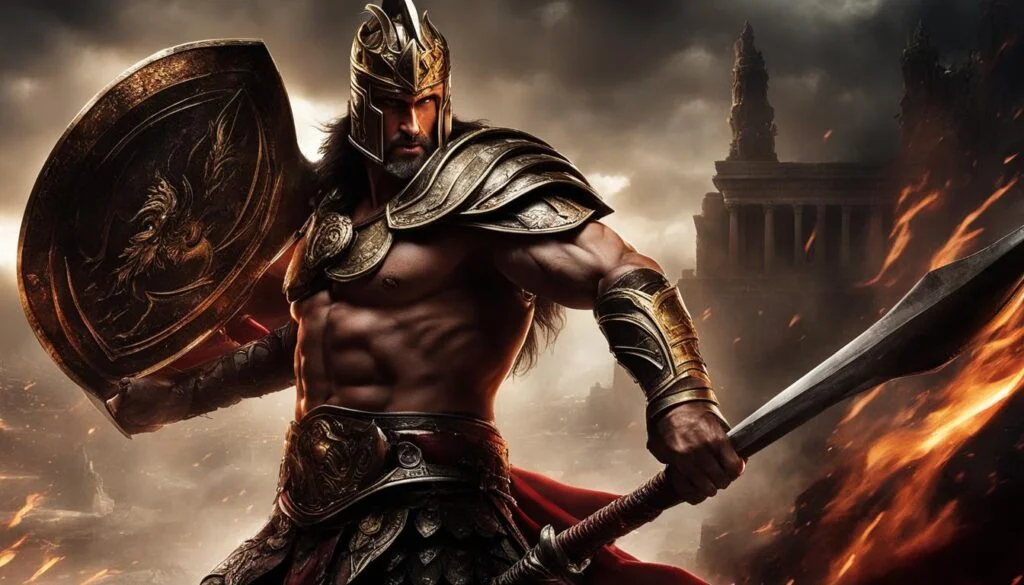Welcome to our article on Ares, the Greek god of war, and his powers in Greek mythology. Ares was known for his formidable strength and physicality, making him a formidable fighter in battle. He possessed a range of abilities that allowed him to cause destruction and bloodshed wherever he went. Join us as we delve into the characteristics and abilities of this powerful deity.
Key Takeaways:
- Ares was the Greek god of war and had immense physical strength.
- He had the power to cause destruction and bloodshed in battles.
- Ares possessed various skills in fighting, weaponry, strategy, and tactics.
- He played a significant role in the Trojan War, supporting the city of Troy.
- Ares had a complex relationship with his sister Athena, who represented the strategic aspect of war.
Ares’ Special Powers and Skills
In Greek mythology, Ares, the god of war, possessed an array of special powers and skills that set him apart from other deities. His attributes in ancient Greece made him a formidable and fearsome figure on the battlefield.
Strength and Physical Prowess
Ares was known for his extraordinary strength and physical prowess, making him an unparalleled fighter. His godly powers endowed him with the ability to overpower his opponents and cause immense destruction in battle. He was a force to be reckoned with, capable of single-handedly turning the tide of a conflict.
Control over Conflict
As the god of war, Ares had the unique ability to manipulate and control all forms of conflict. He could incite and influence both physical and mental battles, drawing power from the chaos and violence. Ares’ war god powers allowed him to invoke war and chaos over large areas, making him a formidable presence on the battlefield.
Combat Skills and Strategy
Not only was Ares immensely strong, but he was also highly skilled in the art of fighting, weaponry, strategy, and tactics. His abilities and role in Greek mythology made him a master of combat, capable of anticipating his opponents’ moves and striking with deadly precision. Ares was a strategic and tactical genius, which made him an indispensable asset to any army.
Ares’ special powers and skills made him a formidable presence in Greek mythology. His unmatched strength, control over conflict, and combat expertise established him as the ultimate god of war.
Ares’ Parentage and Birth
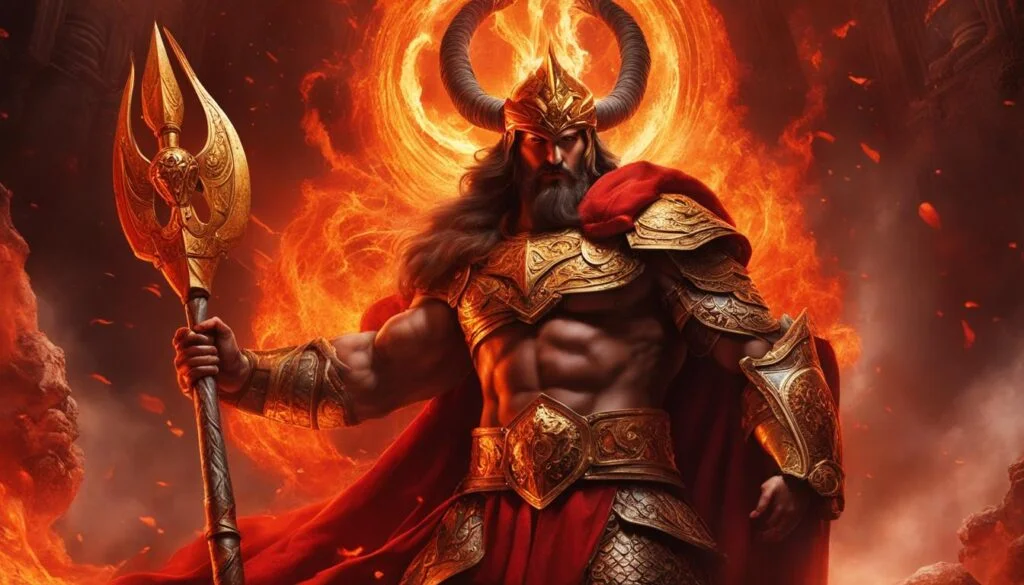
According to Greek mythology, Ares, the god of war, was born to Zeus and Hera, the king and queen of the gods. However, his birth story had a unique twist. It is said that Hera, using a magical herb, gave birth to Ares all on her own, without the involvement of Zeus. This unconventional birth made Ares a symbol of power and strength.
As an infant, Ares’ life took a dangerous turn. He was captured by two giants who imprisoned him in a bronze jar. It seemed that all hope was lost, but fate intervened. The mother of the giants, in a moment of weakness, disclosed the location where Ares was being held captive. The god Hermes, known for his cunning and swiftness, came to the rescue and freed Ares from his confinement.
The parentage of Ares:
- Ares is the son of Zeus and Hera, the king and queen of the gods in Greek mythology.
The birth of Ares:
- According to myth, Hera gave birth to Ares without the help of Zeus, using a magical herb.
Ares’ capture and rescue:
- As an infant, Ares was captured by two giants and trapped in a bronze jar.
- He was eventually rescued by the god Hermes after the giants’ mother revealed the location where Ares was being held.
These events marked the beginning of Ares’ journey as the formidable god of war, ready to unleash his powers on the battlefield. Ares’ parentage and birth story added to the mystique surrounding him, highlighting his divine origins and setting him apart from other gods and goddesses in Greek mythology.
Ares as the God of War
As the god of war, Ares holds a significant role in Greek mythology. He is the personification of war and embodies the violence, conflict, and bloodshed that accompany battles. Unlike his sister Athena, who represents the strategic aspects of war, Ares focuses on the brutality and chaos that arise from armed conflicts. His role is to incite strife and encourage individuals to fight and kill each other, regardless of the outcome.
Ares’ position as the god of war is not limited to physical battles alone, but also encompasses psychological and emotional warfare. He thrives on the chaos and destruction that come with conflicts, drawing power from the bloodshed and suffering. Ares possesses a relentless and ruthless nature, which he exerts over the battlefield, ensuring that the horrors of war are ever-present.
Ares’ Role in Battles
In battles, Ares plays a crucial role in guiding and influencing the outcome. He empowers warriors, infusing them with strength, courage, and a ferocious desire to conquer. Ares is known to favor those who show no mercy and fight with unwavering determination. His presence on the battlefield is often feared, as he brings a sense of terror and frenzy to all who encounter him.
- He grants warriors increased physical strength and endurance.
- Ares instills in them a fiery and uncontrollable rage, enhancing their combat prowess.
- He feeds off the violence and conflict, growing stronger as the battle intensifies.
- Ares incites fear and panic in the hearts of his enemies, destabilizing their morale and resolve.
In summary, Ares’ position as the god of war is characterized by his embodiment of violence, conflict, and bloodshed. He revels in chaos and destruction, inciting strife and encouraging individuals to engage in battles. Ares’ presence on the battlefield empowers warriors and infuses them with the strength and courage to fight fiercely. His role in battles is to ensure that the horrors of war are ever-present, leaving a lasting impact on those who witness his wrath.
Ares in the Trojan War
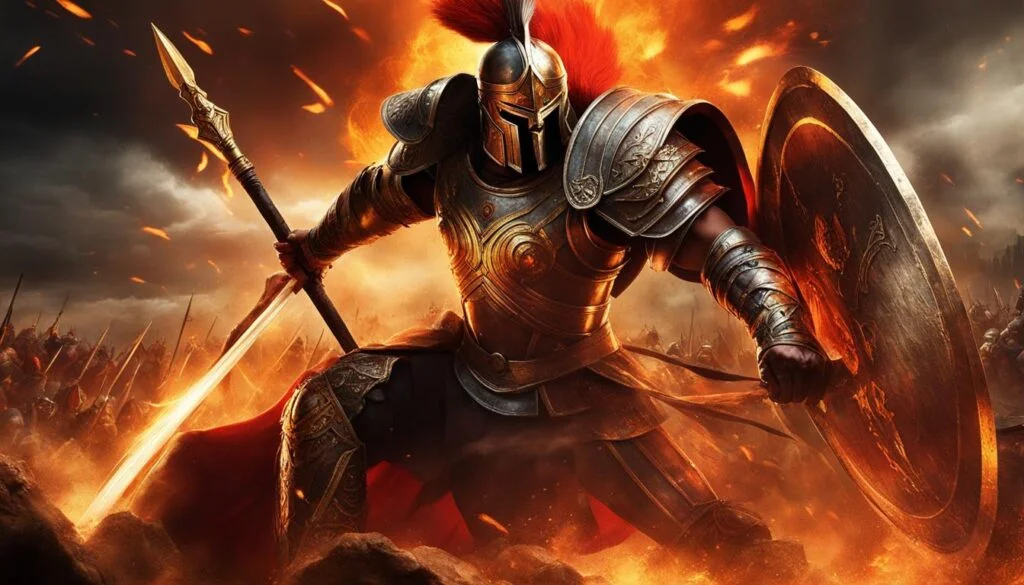
During the Trojan War, Ares, the Greek god of war, played a significant role, although his allegiance was not with the Greeks, but rather with the city of Troy. This created a rivalry between Ares and his sister, Athena, who fought on the side of the Greeks. Ares supported the Trojans in their battle against the Greeks, using his powers to instill courage and strength in the Trojan warriors.
Ares’ support for Troy intensified the conflict and fueled the bloodshed on both sides. His presence on the battlefield was formidable, striking fear into the hearts of the enemy and inspiring the Trojans to fight fiercely. However, despite his efforts, Ares was ultimately wounded in battle.
After being injured, Ares went to his father, Zeus, to complain, but his pleas fell on deaf ears. This highlighted the difference in the gods’ opinions on the war and demonstrated Zeus’ favoritism towards the Greeks. It was ultimately Athena’s intelligence and strategy that helped the Greeks achieve victory over the Trojans, turning the tide of the war in their favor.
Ares’ Role in the Trojan War:
- Ares supported the Trojans in the war against the Greeks.
- His presence on the battlefield instilled courage in the Trojan warriors.
- Ares’ allegiance created a rivalry with his sister, Athena, who fought on the side of the Greeks.
- Despite his efforts, Ares was wounded in battle.
- Athena’s intelligence and strategy ultimately helped the Greeks achieve victory over the Trojans.
Ares and Aphrodite: The Complicated Love Affair
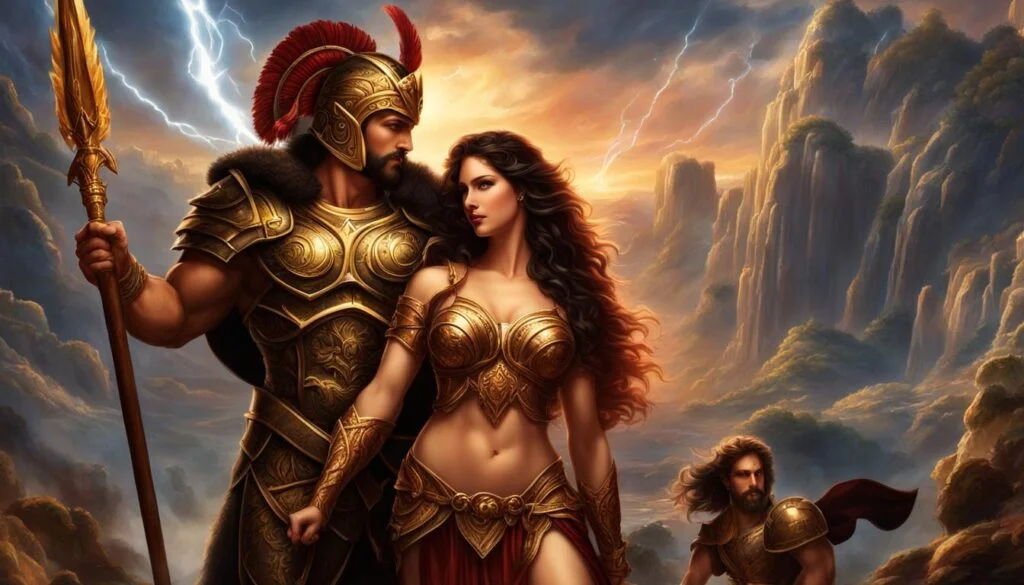
Ares, the Greek god of war, was not only known for his fierce battles and formidable strength but also for his complicated love affair with Aphrodite, the goddess of love. Despite Aphrodite being married to Hephaestus, Ares couldn’t resist his desire for her beauty and charm.
The relationship between Ares and Aphrodite was marked by intense passion and jealousy. They indulged in secret rendezvous, unable to resist the temptations of forbidden love. Their affair was not without consequences, as it brought them into conflict with Hephaestus, Aphrodite’s husband.
When Hephaestus discovered their betrayal, he decided to take matters into his own hands. Using his skills as the god of fire and metalworking, Hephaestus crafted an unbreakable metal web and captured Ares and Aphrodite in a compromising position. The scandalous scene was exposed to the ridicule of the other gods, further complicating their already tumultuous relationship.
The Jealousy and Drama Unleashed
The love affair between Ares and Aphrodite fueled a great deal of jealousy and drama among the gods. Both Artemis and Hermes were said to be especially resentful of their relationship. Hermes, who had once felt an attraction to Aphrodite himself, harbored deep resentment towards Ares for winning her affections.
Artemis, the goddess of the hunt, was also enraged by Ares’ actions. She saw his affair with Aphrodite as a betrayal of the sacred bond between husband and wife. Artemis believed in loyalty and honor, values that Ares had clearly forsaken in pursuit of his own desires.
Hephaestus’ Revenge
For Hephaestus, the betrayal of his wife by Ares was a blow to his pride as well as his heart. In response, he devised a cunning plan to humiliate and punish the two lovers. Hephaestus called upon the other gods to witness the scandalous scene of Ares and Aphrodite ensnared in his unbreakable metal web. The humiliation was a harsh reminder that even the gods were not immune to the consequences of their actions.
The love affair between Ares and Aphrodite serves as a cautionary tale of the perils of forbidden love and the destructive power of jealousy. It is a reminder that even the immortal gods are not exempt from the consequences of their actions, and that love, no matter how passionate, can sometimes lead to heartache and turmoil.
Ares’ Warrior Children
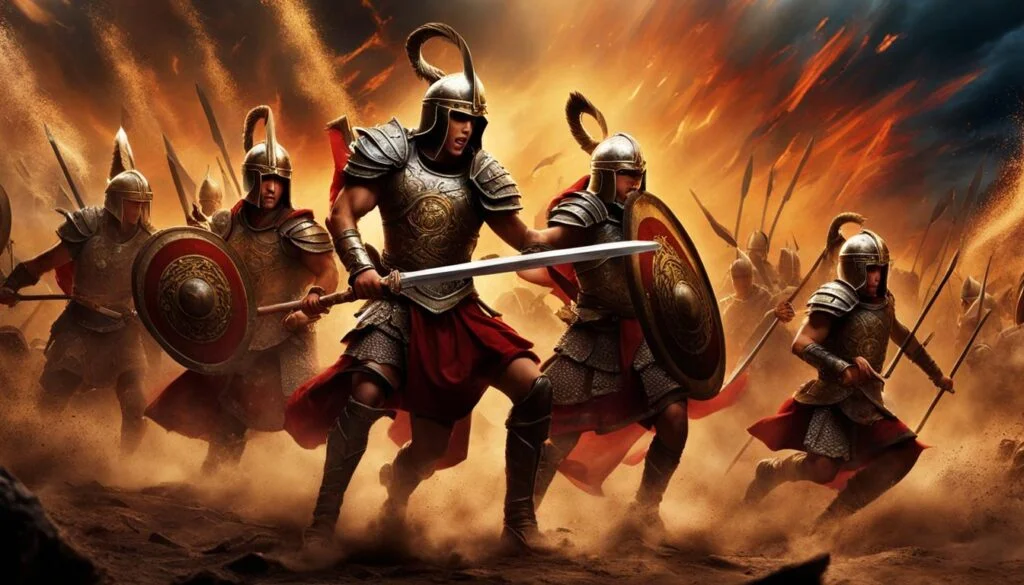
Ares, the Greek god of war, had several children in Greek mythology. His offspring included both divine and mortal children, each with their own unique attributes and roles in Greek culture.
With Aphrodite, the goddess of love, Ares had two sons named Phobos and Deimos. Phobos, the god of fear, and Deimos, the god of terror, often accompanied their father into battle. These fearsome deities played a crucial role in inspiring fear and panic among Ares’ enemies, bolstering his reputation as a formidable warrior.
Ares also had children with mortal women, such as Harmonia, the goddess of harmony, and Eros, the god of love. While these children may seem contradictory to Ares’ warlike nature, they reflect the complexities of his character. Despite his association with conflict and violence, Ares also had the capacity to foster peace and love.
Summary:
- Ares had two sons, Phobos and Deimos, with Aphrodite.
- Phobos was the god of fear, and Deimos was the god of terror.
- Ares also had children with mortal women, including Harmonia and Eros.
- Harmonia was the goddess of harmony, and Eros was the god of love.
- These children reflect the diverse aspects of Ares’ character, encompassing both war and peace.
Ares in Roman Mythology
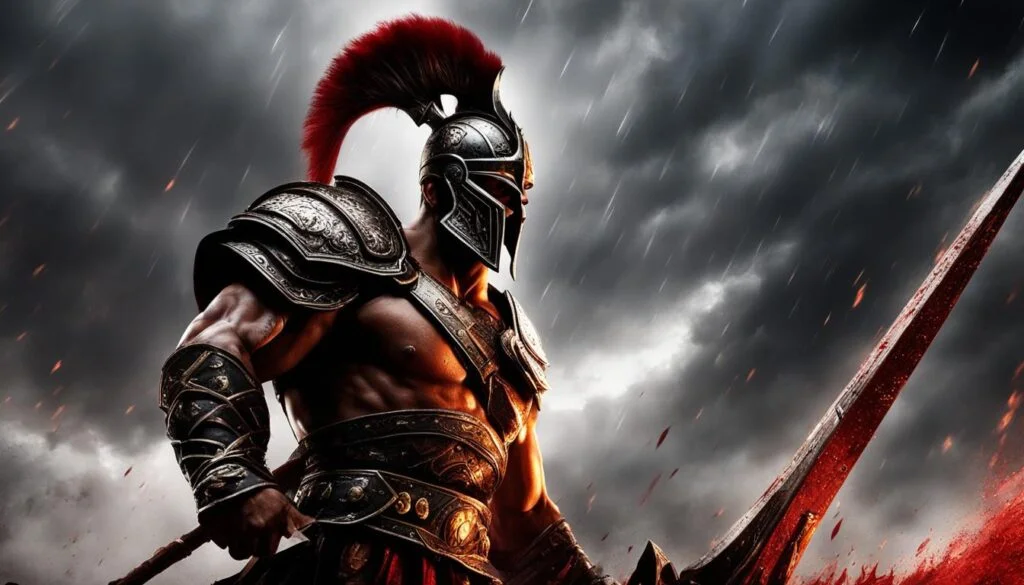
In Roman mythology, Ares was known as Mars. Mars was considered to be a more dignified god and was regarded as the father of the Roman people. While Ares represented the violent aspects of war, Mars embodied a more disciplined and structured approach to combat. The Romans revered Mars as a powerful deity and associated him with agriculture as well.
Unlike his Greek counterpart, Mars was seen as a protector and guardian of the Roman state. He was often depicted wearing armor and holding a spear, symbolizing his role as a defender. Mars was also associated with fertility and agriculture, as the Romans believed that a strong military was necessary to protect their land and resources.
Ares’ Roman counterpart, Mars
One of the key differences between Ares and Mars was their portrayal in art and culture. While Ares was often depicted as a brutal and bloodthirsty warrior in Greek art, Mars was portrayed as a regal and heroic figure in Roman art. The Romans admired Mars for his strength and valor, and he became a symbol of Roman military power.
The influence of Mars extended beyond warfare. He was also associated with the founding of Rome and considered the divine ancestor of the Roman people. The Romans believed that Mars had fathered Romulus and Remus, the legendary founders of Rome. This connection further solidified Mars’ importance in Roman mythology and culture.
Overall, Ares’ transformation into Mars in Roman mythology reflected the Romans’ desire for a more disciplined and organized approach to war. Mars became a revered and respected deity who embodied the values of the Roman state, making him an integral part of Roman culture and history.
Ares’ Limited Magical Ability
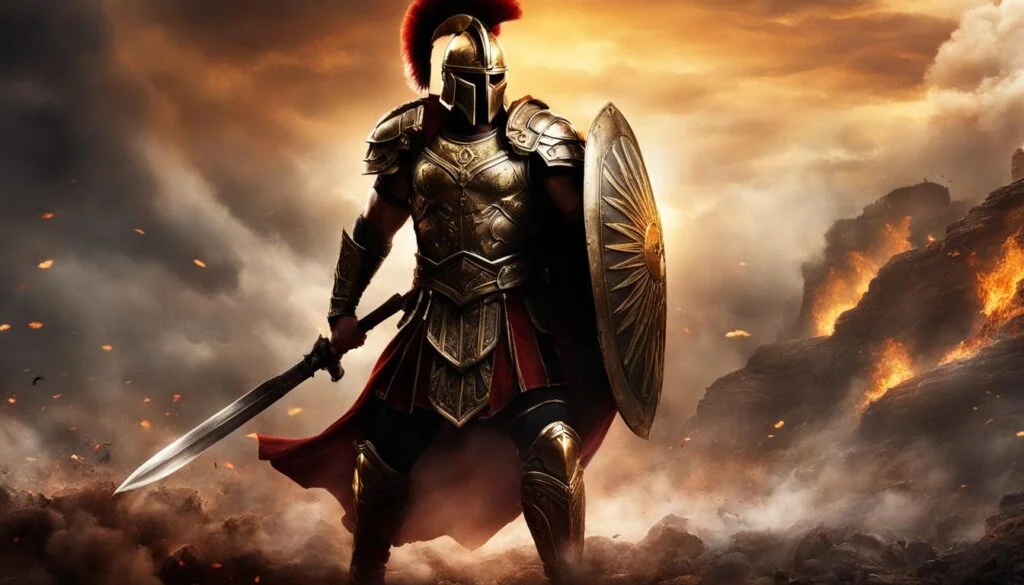
Ares, the Greek god of war, had a range of powers and abilities that made him a formidable force on the battlefield. However, when it comes to magic, Ares’ abilities were somewhat limited compared to other Olympian gods. While he did possess some magical skills, they were not as extensive as his physical and combat abilities.
One of Ares’ magical powers was the ability to sense the presence of other gods and demons. This heightened awareness allowed him to detect and locate divine beings, giving him an advantage in battles and conflicts. Additionally, Ares had the power to summon weapons from Olympus, enabling him to arm himself with powerful and enchanted weaponry.
Although Ares could manipulate and control conflict, his magical abilities were not as versatile as some other gods. For example, he lacked the ability to fly, a skill possessed by certain other Olympian deities. Nonetheless, Ares could transport himself through teleportation, allowing him to quickly move across vast distances on the battlefield.
Ares’ Magical Skills:
- Sensing the presence of other gods and demons
- Summoning weapons from Olympus
- Teleportation for quick movement
Despite his limited magical abilities, Ares’ physical strength and combat skills made him a formidable opponent. His prowess in battle, combined with his ability to incite and control war, solidified his status as the god of war in Greek mythology.
Ares as an Interrogation Expert
Ares was not only revered for his prowess in battle but also for his expert skills in interrogation. As the god of war, he possessed extensive knowledge and experience in extracting valuable information through various means, including torture. Ares’ interrogation expertise added to his fearsome reputation and solidified his status as a powerful deity.
When it came to extracting information, Ares employed a range of brutal and effective methods. His interrogation skills were unparalleled, and he knew how to push individuals to their limits to reveal their secrets. Whether it was through physical torture, psychological manipulation, or a combination of both, Ares had a knack for getting people to divulge the information he sought.
In the realm of interrogation, Ares held a position of authority and respect among both gods and mortals. His ability to extract valuable intelligence made him a valuable asset in times of war and conflict. Ares’ expertise in this area further solidified his role as the god of war, showcasing his relentless determination to gain an advantage over his enemies.
Ares in Greek Art and Culture
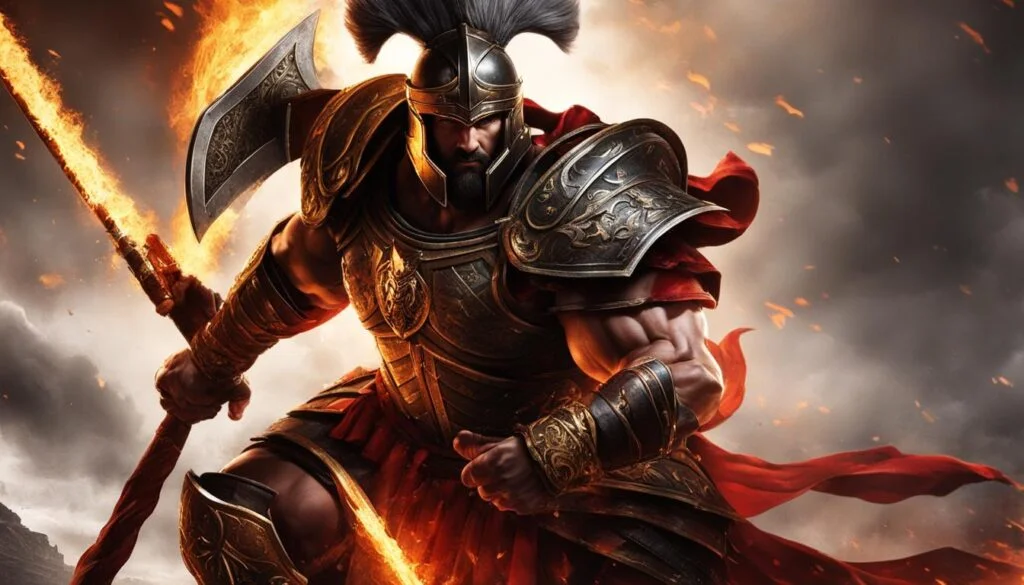
Ares, the Greek god of war, held a significant place in Greek art and culture. He was often depicted in various forms of artwork, showcasing his role as a powerful and feared warrior. In these artistic representations, Ares is typically shown in full armor, carrying a spear and shield, ready for battle. These depictions highlight his physical strength and emphasize his association with warfare and conflict.
Ares’ representation in Greek art reflected the admiration and respect he garnered from the ancient Greeks. Warriors sought his protection and support in battle, believing that his presence would bring them victory. His images were prominently displayed in temples, where people offered prayers and sacrifices, seeking his favor and guidance.
In addition to visual art, Ares also played a significant role in Greek literature. He appeared in numerous myths and legends, often central to stories of war, violence, and heroic exploits. These stories showcased his prowess in battle and highlighted his complex relationships with other gods and goddesses.
The Popularity of Ares in Ancient Greece
Ares’ popularity extended beyond the realms of art and literature. In ancient Greece, he was revered and widely recognized as the god of war. His influence was felt in various aspects of society, from military strategies to cultural practices.
- His presence was invoked during military campaigns, where soldiers sought his blessing and protection.
- Ares was an integral part of religious festivals and ceremonies, where rituals were performed to honor and appease him.
- He was often portrayed as a symbol of strength and courage, inspiring warriors to fight with valor and determination.
The legacy of Ares lives on, as his representation in Greek art and literature continues to captivate and inspire. His image reminds us of the significance of war in ancient Greek society and the powerful role played by gods in shaping their beliefs and actions.
Conclusion
In summary, Ares, the Greek god of war, possessed a wide range of powers and abilities in Greek mythology. His incredible physical strength and combat skills made him a formidable force on the battlefield. Ares had the remarkable ability to manipulate and control all forms of conflict, drawing power from the chaos and destruction he caused.
Throughout Greek mythology, Ares played a significant role in the portrayal of war and violence. Unlike his sister Athena, who represented the strategic aspect of war, Ares embodied the bloodlust and cruelty that accompanied battles. His ruthless nature fueled his desire to incite strife and encourage people to fight and kill each other, regardless of the consequences.
Despite his reputation for cruelty, Ares also had complex relationships with other gods and possessed some peaceful attributes. He fell in love with Aphrodite, the goddess of love, although their affair was ultimately exposed and ridiculed by the other gods. Ares also had children associated with more peaceful qualities, showing a different side to his character.
Ares’ legacy continues to be celebrated in modern culture through various forms of art, literature, and popular media. His representation in Greek artwork often depicts him as a fierce warrior in full armor, highlighting his significance as the god of war. In literature, Ares appears in numerous myths and legends, particularly those involving war and conflict. This enduring presence showcases the enduring impact of Ares’ powers and mythology on Greek culture.
FAQ
What powers did Ares have in Greek mythology?
Ares had extraordinary strength and physical prowess. He could manipulate and control all forms of conflict, draw power from it, and invoke war and chaos over a large area. Ares was also highly skilled in fighting, weaponry, strategy, and tactics.
What were Ares’ special powers and skills?
Ares had extraordinary strength, physical prowess, and combat skills. He could manipulate and control all forms of conflict, draw power from it, and invoke war and chaos. Ares was highly skilled in fighting, weaponry, strategy, and tactics.
Who were Ares’ parents and what is his birth myth?
Ares is the son of Zeus and Hera, the king and queen of the gods in Greek mythology. According to certain myths, Hera gave birth to Ares without the help of Zeus, using a magical herb. As an infant, Ares was captured by two giants and trapped in a bronze jar, but he was eventually rescued by the god Hermes.
What role did Ares play as the god of war?
Ares was the personification of war and violence in Greek mythology. Unlike his sister Athena, who represented the strategic aspect of war, Ares embodied the bloodlust and cruelty that took place during battles. He focused on causing strife and encouraging people to fight and kill each other.
What was Ares’ role in the Trojan War?
Ares supported the city of Troy throughout the Trojan War, constantly at odds with his sister Athena, who fought on the side of the Greeks. Ares was wounded in battle and went to Zeus to complain, but his father ignored him. Ultimately, it was Athena’s intelligence and strategy that helped the Greeks defeat the Trojans.
What was Ares’ relationship with Aphrodite?
Ares fell in love with Aphrodite, the goddess of love, but she was married to Hephaestus, the god of fire and metalworking. When Hephaestus discovered their affair, he captured Ares and Aphrodite in an unbreakable metal web and exposed them to the ridicule of other gods.
Did Ares have children?
Yes, Ares had several children with both goddesses and mortal women. Two of his children with Aphrodite, Phobos and Deimos, often accompanied him into battle. He also had children with mortal women, including Harmonia and Eros.
How is Ares portrayed in Roman mythology?
In Roman mythology, Ares is known as Mars. Mars represents a more disciplined and structured approach to combat compared to the violent aspects associated with Ares. The Romans revered Mars as a powerful deity and associated him with agriculture as well.
What were Ares’ magical abilities?
Ares possessed limited magical abilities, including the ability to sense the presence of other gods, demons, and the use of magic. He could summon weapons from Olympus, teleport himself, and call upon other gods for assistance.
Was Ares skilled in interrogation methods?
Yes, Ares was skilled in various interrogation methods, including torture. He had extensive knowledge and experience in extracting information from individuals through various means.
How was Ares depicted in Greek art and culture?
Ares was often depicted in artwork as a warrior in full armor, carrying a spear and shield. He played a prominent role in myths and legends related to war and conflict. In ancient Greece, he was respected and admired by warriors who sought his support and protection in battle.


